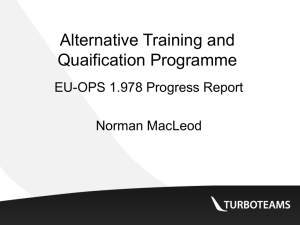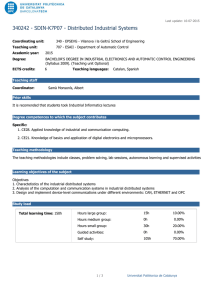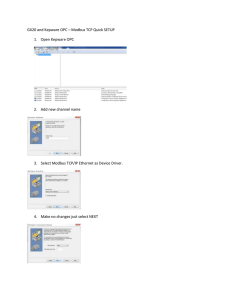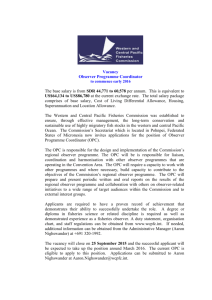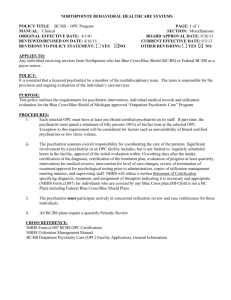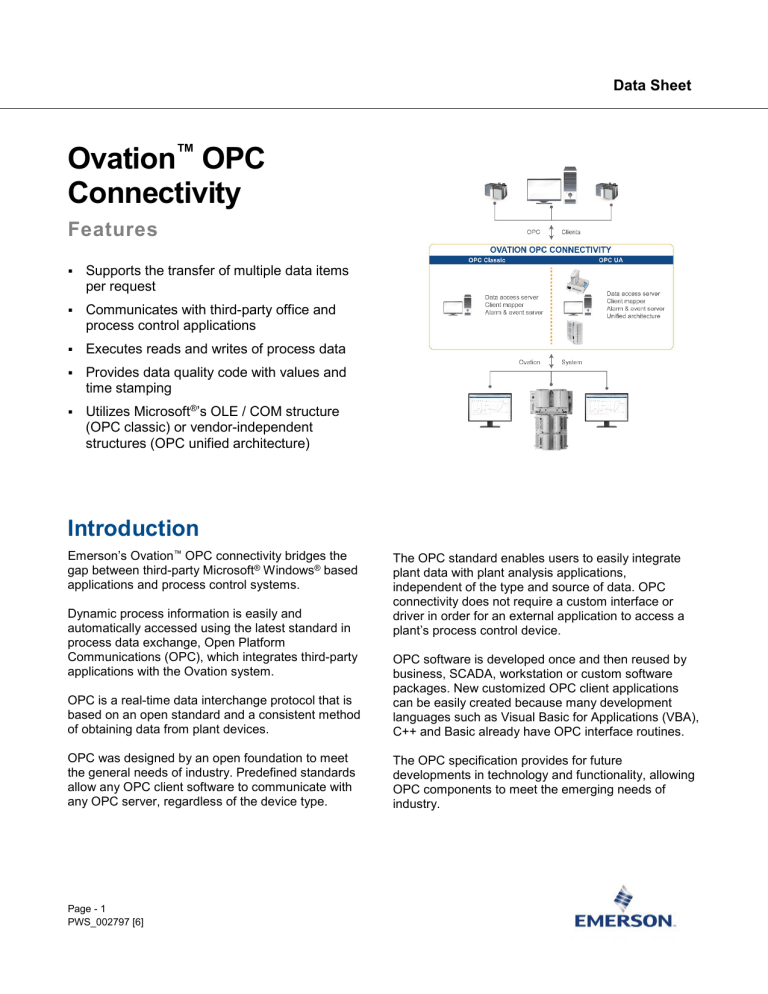
Data Sheet
Ovation™ OPC
Connectivity
Features
Supports the transfer of multiple data items
per request
Communicates with third-party office and
process control applications
Executes reads and writes of process data
Provides data quality code with values and
time stamping
Utilizes Microsoft®’s OLE / COM structure
(OPC classic) or vendor-independent
structures (OPC unified architecture)
Introduction
Emerson’s Ovation™ OPC connectivity bridges the
gap between third-party Microsoft® Windows® based
applications and process control systems.
Dynamic process information is easily and
automatically accessed using the latest standard in
process data exchange, Open Platform
Communications (OPC), which integrates third-party
applications with the Ovation system.
The OPC standard enables users to easily integrate
plant data with plant analysis applications,
independent of the type and source of data. OPC
connectivity does not require a custom interface or
driver in order for an external application to access a
plant’s process control device.
OPC is a real-time data interchange protocol that is
based on an open standard and a consistent method
of obtaining data from plant devices.
OPC software is developed once and then reused by
business, SCADA, workstation or custom software
packages. New customized OPC client applications
can be easily created because many development
languages such as Visual Basic for Applications (VBA),
C++ and Basic already have OPC interface routines.
OPC was designed by an open foundation to meet
the general needs of industry. Predefined standards
allow any OPC client software to communicate with
any OPC server, regardless of the device type.
The OPC specification provides for future
developments in technology and functionality, allowing
OPC components to meet the emerging needs of
industry.
Page - 1
PWS_002797 [6]
Ovation™ OPC Connectivity
Ovation OPC Connectivity
Architecture
OPC exchanges information between an OPC server
application and OPC-compliant software applications
called “clients”. An OPC server collects data from a
field device via the plant network and delivers it to the
OPC client software. Ovation OPC connectivity can
be comprised of a combination of the following
software applications:
Data access server (DA)
Alarm and event server (AE)
Client mapper (CM)
Unified architecture (UA)
Ovation OPC client/server software can be loaded
onto an existing Ovation drop that has been
configured to function as an OPC communicator. The
software can also be loaded onto a standalone
workstation depending upon the communication
requirements.
Ovation’s OPC software organizes process points in
a tree-like structure, allowing easy access to all point
information from both the client application and the
end user.
Data Sheet
Multiple clients can connect to a single OPC data
access server application. Each client interfaces with
a separate instance of an OPC server object within
the OPC data access server. This means each client
has its own set of OPC groups and items.
A dedicated graphic provides indication of
communication status and other important
characteristics of the Ovation OPC data access
server such as security, item updates and read/write
statistics.
Ovation OPC Unified
Architecture Server
An Ovation OPC unified architecture server is a
software program that runs on a Windows-based
workstation or select Ovation hardware and supports
OPC unified architecture standard version 1.03.
The OPC unified architecture includes all OPC data
access server functionality with added features such
as security through encryption, user control and
authorization. The unified architecture software is
platform agnostic which allows for the drivers to be
embedded within the Ethernet link controller module
and the Ovation compact controller (Model OCC100).
The Ovation OPC data access server application
reads control system data by creating groups of
specific process points.
Ovation OPC Alarm and
Event Server
The OPC client mapper software determines how
often the data access server checks the Ovation
system for new point information and sends a
message when a group point value has changed.
Alarms and events are indications that something
within the process requires immediate operator
attention. The Ovation OPC alarm and event server
is a software application which exports Ovation alarm
and event information to a compatible OPC alarm
and event client.
Ovation OPC Data Access
Server
Ovation’s OPC data access server is a software
program that runs on a Windows-based workstation
and supports the OPC data access standards
versions 3, 2 and 1.
The OPC data access server receives data access
requests from third-party OPC clients, providing a
continuous stream of live process data.
Page - 2
PWS_002797 [6]
Ovation’s OPC alarm and event server software also
has the optional ability to generate sequence-ofevents (SOE) and operator event messages. Status
of the Ovation OPC alarm and event server can be
viewed in the OPC monitoring tool which provides
server and client connection information.
The Ovation OPC alarm and event server supports
the OPC alarm and event 1.10 standard.
Ovation™ OPC Connectivity
Data Sheet
Ethernet link controller module or Ovation
compact controller
OPC Client Mapper
The Ovation OPC client mapper interfaces an
Ovation system to any OPC server which enables
reading and writing of information between the
systems. OPC’s client mapper supports OPC data
access versions 1.0 and 2.0 standard specifications
and can communicate to multiple third-party OPC
servers.
Requires license manager server software
(included)
The minimum Ovation software version for the
OPC alarm event server is 2.4 and later
Ovation OPC connectivity redundancy is achieved by
installing two workstations equipped with Ovation
OPC client mapper software. In the redundant
configuration, one OPC client mapper workstation
performs control while the other acts as a backup. If
the workstation in control fails, shuts down or has
some problem where it no longer functions as an
Ovation client mapper workstation, the backup
workstation will detect the issue and take control.
Additionally, if the OPC client mapper software
forcibly fails one of the workstations, the backup will
take control.
Technical Requirements
Licenses
OPC Data Access, Alarm & Event or
Unified Architecture
Ovation OPC applications use a license manager to
limit the number of concurrent connections for process
data transfer. The following OPC applications require
licenses to operate:
Ovation systems - A dedicated or existing
Windows workstation on an Ovation network
connection via driver or appropriate network
interface card
The operating system of the OPC server
workstation must be Windows 7, 2008 server and
newer
The OPC unified architecture software can
operate on a Windows workstation, Ovation
OPC Client Workstation
The operating system of the OPC client
workstation must be Windows 2008 server or
Windows 7 and newer
Connected to the Ovation network via driver and
appropriate network interface card
Security
Process security between the control system and an
enterprise-wide LAN/WAN connection is controlled by
a Cisco firewall for network/highway level security
and Microsoft Windows for workstation level security.
Ovation OPC data access server (based on the
number of client connections)
Ovation OPC unified architecture (based on the
number of installations)
Ovation OPC alarm and event server with license
options for sequence of events and operator
events
©2017-2018 Emerson. All rights reserved. The Emerson logo is a trademark and service mark of Emerson Electric Co. Ovation™ is a mark of one of the Emerson Automation Solutions
family of business units. All other marks are the property of their respective owners. The contents of this publication are presented for information purposes only, and while effort has been
made to ensure their accuracy, they are not to be construed as warranties or guarantees, express or implied, regarding the products or services described herein or their use or
applicability. All sales are governed by our terms and conditions, which are available on request. We reserve the right to modify or improve the designs or specifications of our products at
any time without notice.
Page - 3
PWS_002797 [6]

